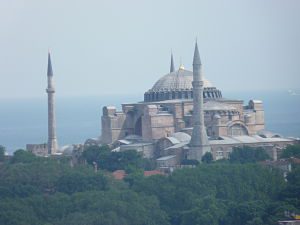Today is the feast of Constantine: one of those rare heroes that certain people love to hate and blame for everything.
Left-wing Christians blame him for bringing Imperial power to a more pure Christianity as if the three hundred years between the death of Jesus and Constantine’s rule never happened. Evidently, the Church should have rejected the Emperor’s conversion and urged him to return to state persecution of the Church so they could remain “pure.” The advocates of such views rarely move to countries in the world (North Korea, Iran, and Syria are available) where such purity is easily possible. Secularists pretend Constantine invented Christianity, wrote the Bible, and established Orthodoxy. The theological controversies and lively Church debates, formation of the canon of Scripture, and development of the Faith for over three hundreds years before Constantine are missing for these people, too. My favorite example is a right wing Christian text book which manages to be wrong in two different ways in one sentence. It claims: Constantine made Christianity the “official” religion of the Roman Empire (that was later with Theodosius) and that Constantine introduced pagan practices to the Church. There is no evidence he did any such thing.
What Constantine did do was end the second class status of Christians that led to their periodic persecution by imperial authorities. With his mother, Helena, he favored the Christian faith, but did not end religious freedom for pagans. He was no theologian, but he encouraged rigorous intellectual debate in the Church. He was no “saint” as a ruler, he lived in perilous times, but he acted boldly and saved civilization. He left dying Rome for a new defensible capital, Constantinople, the Minas Tirith of the ancient world: the great city protecting European culture from extinction. This city defied most aggression for one thousand years and kept a secular and Christian university tradition alive from beginning to end. Eventually, Constantine’s city would establish a great Greco-Roman commonwealth that would flower in civilizations like Russia, Romania, and Bulgaria.
If you like reading ancient Greek manuscripts, thank Constantine.
Constantine presented the Church with a problem. What happens if you win? Christianity is true and eventually the competitors run out of excuses. They become gods that have obviously failed. Constantine saw the light, perhaps in a miraculous vision, and moved in our direction. Was he perfect? He was not. Like George Washington as President, Constantine had no precedent to follow and no example. He was an Emperor who suddenly faced moral restraints from a Law higher than Caesar.
What happens when you win?
Civilization is saved for one thousand years. Those who reject Constantine rarely have a way of governing. Until Jesus returns, they dare not win or persuade a majority because then they would have to govern. To govern is to move from martyr and victim, to ruler and decision maker and mistakes multiply. The martyr most merely die well, the Christian ruler must govern well. Nobody has done this perfectly and Constantine did not even do it very well. But Constantine tried and fused the truth of Christianity to the best of Greek and Roman civilization and so saved both.
If we can honor the slave holding Washington for what he did right, and we should and can, then we should honor Constantine on his day for being a man who saved us all. He built a wall against barbarism that served Christendom well for a millennium. He began (so imperfectly) the process of dealing with the relationship of Church and state. Constantine did not subordinate the Church to the state: later Emperors faced rebukes from powerful patriarchs. He did give the Church the chance to save half the Empire. The West was not so lucky.
Constantine lived in times where it seemed his nation, Rome, was doomed. Rome faced enemies from within and without. Rome was broke. Rome was morally broken. Constantine (all too dimly!) saw that Jesus was the answer. He made Christ King as much as he could . . . his failures were real, but his triumph saved philosophy, science, and high culture for better days. He built an Eastern Roman Empire (Byzantium) and this Empire saved much that would otherwise have been lost and remembered much that was elsewhere forgotten. The flowering of the Byzantine (Eastern Roman) Renaissance would produce the Western Renaissance and the entire world is blessed as a result.
Constantine’s particular solutions would not be appropriate to this age. We have learned a thing or two since his time thanks in part to the time he bought us and the texts he saved for us. Still this patriot, this man who tried and succeeded, is an example of possibility.
In these difficult days, surely there is hope in the life of Constantine. There is the hope that some city in the hinterlands can arise as a new center for American renewal. Some people can unite and save classical education and culture. We need no single leader to see visions and raise the standard . . . the seeds Constantine planted are rooted in all Christian men and women with hopes for something better than a twilight defeat. Instead, we need a community and not just a single man who on a day of doom can look up to Heaven and see the Cross and know that in this sign we can conquer.
Conquer? We will not conquer like the old Emperor still half in paganism’s darkness. No. We will conquer, if the Spirit is willing, hearts and minds by better arguments, greater cities, stronger charity, and profound service. We will build a new city and wait there for the better city to come and the divine Emperor.

God help us. We wait for the Constantine spirit: the Spirit of renewal, hope, victory, and of King Jesus.












